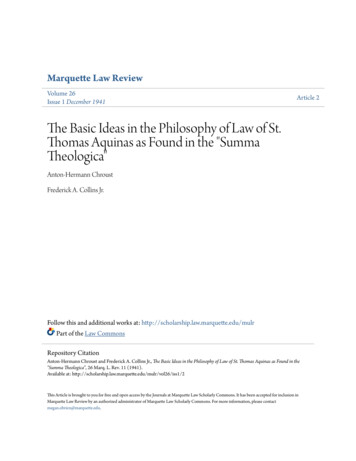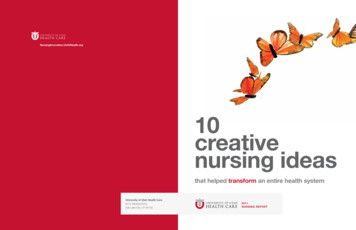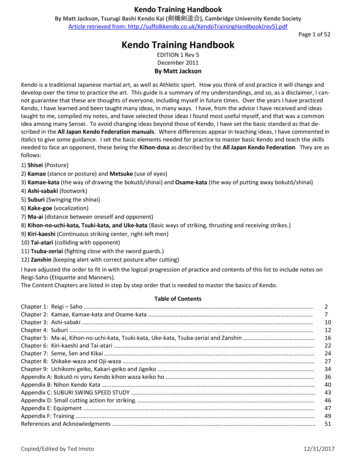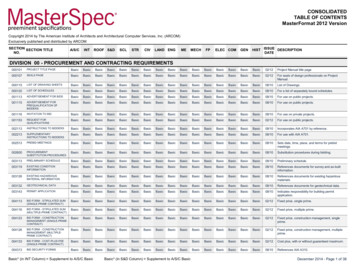
Transcription
Marquette Law ReviewVolume 26Issue 1 December 1941Article 2The Basic Ideas in the Philosophy of Law of St.Thomas Aquinas as Found in the "SummaTheologica"Anton-Hermann ChroustFrederick A. Collins Jr.Follow this and additional works at: http://scholarship.law.marquette.edu/mulrPart of the Law CommonsRepository CitationAnton-Hermann Chroust and Frederick A. Collins Jr., The Basic Ideas in the Philosophy of Law of St. Thomas Aquinas as Found in the"Summa Theologica", 26 Marq. L. Rev. 11 (1941).Available at: s1/2This Article is brought to you for free and open access by the Journals at Marquette Law Scholarly Commons. It has been accepted for inclusion inMarquette Law Review by an authorized administrator of Marquette Law Scholarly Commons. For more information, please contactmegan.obrien@marquette.edu.
THE BASIC IDEAS IN THE PHILOSOPHY OF LAW OF ST. THOMASAQUINAS AS FOUND IN THE"SUMMA THEOLOGICA"*ANTON-HERMANN CHROUST** and FREDERICK A.COLLINS, JR.INTRODUCTIONLURINGthe seventeenth and eighteenth centuries, when all juris-prudential theories were more or less under the influence of whatmight be called "secular natural law," it was commonly thought thatan entirely new approach to juristic thinking had been discovered.This general belief was due almost completely to Pufendorf whoclaimed that there existed no natural law in the middle ages. He madethe totally unfounded assertion that Grotius was the true founder ofthe "Natural Law School," and that to himself goes the credit of having put natural law on a strictly scientific basis.' His belief, undoubtedly, is but the result of the general disregard in which the middleages and scholastic thought in particular were held during the seventeenth and eighteenth centuries. Pufendorf convinced himself that theschoolmen had spread great darkness over the whole field of philosophical and legal thinking. He frequently called the middle ages"regnum tenebrarum."'2 And Christian Thomasius-disciple of Pufendorf-in his "Historia Iuris Naturalis Paulo Plenior" (1719), referring to the middle ages, often uses the phrase, "misera conditio iurisnaturalis." Pufendorf's attitude caused a great and lasting breach inthe development of the legal-philosophical tradition of the Westernworld. This was due, primarily, to the great scholarly reputation whichPufendorf-unwarrantedly-enjoyed throughout the seventeenth andeighteenth centuries, during which time he occupied the place of anearly uncontested leader among juristic thinkers. The result was that*EDrroR's NoTE: In submitting this article to the REVIEw, Dr. Chroustwrote: "It has always been felt . . .that a short and simple presentation ofSt. Thomas's jurisprudence would be of great help to the student of jurisprudence. It is, however, impossible for the average student to make use ofall the Thomistic sources and the Thomistic literature, since the amount ofprescribed reading in the general course of jurisprudence-at Harvard andelsewhere-is already enormous. On the other hand, it has been my personalexperience that, even among non-Catholic students, a great interest existsfor Thomistic jurisprudence, which would be greatly increased if some kindof simple but thorough presentation of this topic could be made available tothe average student." The editors of the REVnw believe that this article isof the type of which Dr. Chroust writes.**Former member of the German bar.IPUFENDORF,SPECIMEN CONTROVERSIARUM, C. 1, sec. 4; and c. 5, sec. 22.2Ibid., c. 1, sec. 1 and 5.
THE MARQUETTE LAW REVIEW[Vol. 26this disdain for the schoolmen became somewhat of an academic"dogma," the more so, since no one felt it necessary to venture beyondGrotius or Pufendorf in order to learn what had actually been donein the field of jurisprudence long before the arrival of Grotius. So it isnot altogether surprising that neither he, nor the many natural lawthinkers following him could appreciate the schoolmen and their important achievements in the domain of natural law.Of course, not all the blame can be laid at the feet of Pufendorf.At approximately the same time, the first comprehensive "history ofphilosophy" appeared under the significant title: "De DoctoribusScholasticis Corrupta Per Eos Divinarum Atque Humanarum RerumScientia" (1665)-by Adam Tribbechovius. In 1742 Brucker's "Historia Critica Philosophia"3 was published, which likewise was basedon an "anti-scholastic" approach to the subject. These two books didmuch to open a wide gap between the philosophy of the middle agesand that of "modern" times, becoming somewhat the standard "textbooks," consistently imitated by subsequent works on the history ofphilosophy.This general "reaction" against scholastic thought had its primesource in the rise of a new type of philosophy which tried, in an independent manner, to solve the problems which it had in common withtheology. From a mere presentation or defence of the accepted Churchdogma it passed to its criticism, and finally, in complete independenceof religious interests, sought to derive its new teachings from thesources which it thought it possessed in the "lumen naturale," that is,in human reason and experience. 4 Thus all that the middle ages hadcontributed to man's knowledge and moral comfort was thrown out asunworthy even of research. It was this complete break with the tradition that made for a long time to come the medieval mind seem notunderstandable to "modern" minds. 5By doing what the men of the seventeenth and eighteenth centuriesfelt it beneath them to do, that is, by making a thorough study of thesources of medieval philosophy, we should be able to change ratherdrastically the grim picture painted by Pufendorf and others. As isprobably true of many great philosophical works of lasting importance,3Brucker's "Historia Critica Philosophiae" was probably Kant's main sourceof historical information.4 Compare, for instance, Laurentius Valla, "Dialecticae Disputationes contraAristotelicos" (1499), III, 9; Bernhardinus Telesio, "De Natura Rerum JuxtaPropria Principia" (1566), Prooemium; Francis Bacon, "The Advancement ofLearning" (1609), III, 1 (Works, edit. Spedding, I 539) ; Nicholaus Taurellus,"Philosophiae Triumphus" (1573), I, 1; Aureolus B. Paracelsus, "Das BuchParagranum" (1565), edit. Hauser, II, 23 et sequ.; Giordano Bruno, "DellaCausa, Principio et Uno" (1584), I, 2 and 6 et seq.5 See, in this connection, H. Heimsoeth, "Die sechs grossen Themen derabandlaendischen Philosophie und der Ausgang des Mittelalters," 2d edition,Berlin, 1934.
19411ST. THOMAS AQUINASa germ of almost every school of jurisprudence may be found in the"Summa Theologica." But two are particularly prominent-primarilythat of natural law, and secondarily that of the social-philosophicalschool.6It was such great thinkers as St. Augustine, Alexander Helensis,Bonaventura, Albertus Magnus, and especially St. Thomas Aquinaswho elaborated thoroughly those bases of natural law that Pufendorfcould not believe were to be found in the writings of the schoolmen.It is safe to say that such legal systems as those of Pufendorf,Thomasius, or Wolff, which were supposed to be entirely new systemsof natural law in contradistinction to the scholastic systems, were intheir essence nothing but a revival of scholastic legal thought, withvery little change; much inferior, however, in "quality" as well as inunderstanding the real problem of natural law.St. Thomas divided his philosophical system of law into three majorsections: 1. The Eternal or Divine Law, 2. The Natural Law (LexNaturalis), and 3. The Human Law. Under each there are severalsubdivisions. We shall consider them in this, his own, order.A rough diagram of St. Thomas Aquinas's system of law may be ofhelp in understanding each part in its relation to the whole, and tothe other parts:I. Lex Aeterna or Divine Law.II. Lex Naturalis, which partakes in, and is derived from theDivine Law. This is divided into (a) primary natural law, and (b)secondary natural law. The latter derived from the primary naturallaw principles.III. Human or Positive Law which derived from natural law bythe use of human reason, and must be in conformity with the Divineand natural laws. It is necessary because the precepts of the naturallaw are quite often blurred in the mind or heart of man through sin.LEx AETERNA OR DIVINE LAwThe great task of St. Thomas Aquinas was to complete the processof reconciling the Aristotelian-Alexandrian tradition with Christianthought, a task begun by Alexander Helensis, Banaventura, and Albertus Magnus. His ultiniate endeavour was to formulate and groundan absolute and harmonious "cosmic order" where everything wouldhave its particular place according to its specific characteristics orproperties. Therefore one of his main tasks underlying his "SummaTheologica" was to determine the-position of man in this eternal andwise order of the created Universe. In this created world order6JHEPING,DER ZwEcKIm RECHT,2d edition, II, p. 161 ff. (quoted in footn. 57).
THE MARQUETTE LAW REVIEW[Vol. 26St. Thomas Aquinas conceives of three realms.7 First, the "Ontologicalorder" of things according to which everything existent is determinedby its desire of preserving its being. Secondly, the "cosmic-vitalisticorder" which deals with such teleological functions as procreation andthe satisfaction of other vital animal needs that nature has taught allanimals according to the eternal order of things. Thirdly, the sphereof the "animal rationale et sociale," which is the realm of moral perfection-to know the truth about God, and to live in society.In all these realms there is but one basic law-the Lex Naturalis,by means of which God maintains order within the created Universe.Since man is a rational creature, endowed with the faculty to knowthe truth about God, the Lex Naturalis becomes for him in particulara participation in the Lex Aeterna,8 that is, a participation in theDivine Wisdom. Both these concepts, the Divine reason and the LexAeterna, were first developed by St. Augustine. St. Thomas frequentlyrefers to him as an authority, and particularly as regards thesenotions. 9 Since the Lex Aeterna, which "is nothing else than the typeof Divine Wisdom, as directing all actions and movements," 10 constitutes the foundation of St. Thomas's theory of law, and because hehimself credits St. Augustine as being his authority, we shall dealshortly with St. Augustine's Lex Aeterna, in order to give us a betterunderstanding of St. Thomas's basic position.St. Augustine says in "De Diversis Quaestionibus," quaest. 79, art.1, "est enim lex universalis, divina sapientia." In "De Libero Arbitrio,"I, 6, he furthermore states: . "that Law which is called the SupremeReason, which must always be followed, and through which the badones earn (deserve) the miserable, and the good ones the blessed life,through which all that we speak of as temporal is carried out in theright manner, and is directed (changed) in the right way, cannot beunderstood to be otherwise than unchangeable and eternal." And inthe same work at I, 5, he asserts that the Eternal Law exists in themind of God where all things are directed to their proper ends. Andagain he says that, "the Eternal Law is Divine Reason, the Will ofGod, which orders us to maintain the natural order . "11 Thus St.Augustine founded and defined the basic concept of the whole of thenatural law of the middle ages, by introducing the concept of the LexAeterna.12 It is most important to remember that his Lex Aeterna is7 SUMMA THEOLOGICA, I. II., quaest. 94, art. 2.8 Ibid., quaest. 91, art. 2; art. 3; art. 4; quaest. 93, art. 6.9Ibid., quaest. 91, art. 1; art. 2; art. 3; art. 4; art. 5; quaest. 93, art. 1; art. 2;art. 3; art. 4; art. 6.10 Ibid., quaest. 93, art. 1.21 "Contra Faustum," XXII, 27.12 St. Augustine carried his Lex Aeterna principle into his Lex Naturalis. Forthe Lex Aeterna is indelibly impressed on the soul of man. "Ex hac ineffabiliatque sublimi rerum administratione, quae fit per divinam providentiam,quasi transscripta est naturalis lex in animam rationalem, ut in ipsa vitae
1941]ST. THOMAS AQUINASnot an impersonal law or "cosmic reason" like that of the Stoics towhich God, too, would have been subjected, but it is the personal willof God Himself.St. Thomas Aquinas's conception of the Lex Aeterna is very similar to that of St. Augustine. It is the objective and absolute a prioriof everything that is called a "rule and measure." It exists in itselfand can only be conceived through itself. The Divine intellect eternallyremains the measure and rule of all things, and each thing has truthto the degree that it presents the Divine intellect. So a Divine concepthere the law-is true by reason of itself.13 St. Thomas Aquinas statesthat the law is the practical reason emanating from a ruler. The createdUniverse is ruled by Divine providence, consequently the communityof the Universe is governed by Divine reason. So the very Idea of theeternal government of all things in God has the nature of a law.And since the Divine reason is not subject to time, but is eternal, itslaw, too, must be eternial. 14 All things are created by Divine wisdom,and that type of Divine wisdom which moves all things to their dueend bears the character of a law. Hence the Lex Aeterna is nothingbut Divine wisdom directing all actions and movements. 5St. Thomas Aquinas gives four reasons for the necessity of theLex Aeterna. The first is that man is ordained to an end-to eternalhappiness. Since he could not achieve this end through his own powers,it is necessary that he be directed to it by a law given by God. But itis his second reason that is of greatest importance for his theory oflaw. He says, "because, on account of the uncertainty of humanjudgment, especially on contingent and particular matters, differentpeople form different judgments on human acts; whence also differentand contrary laws result. In order, therefore, that man may knowwithout any doubt what he ought to do and what he ought to avoid,it was necessary for man to be directed in his proper acts by a lawgiven by God, for it is certain that such a law cannot err.""' His thirdreason is that man is not competent to control the interior workingshuius conversatione moribusque terrenis homines talium distributionumimagines servent." (De Diversis Quaestionibus, quaest. 53, art. 2.) Thus wefind in ourselves the ultimate principles of right and justice. The Lex Naturalisis but the preservance of the eternal "cosmic order," as expressed in the LexAeterna. "Deus ordinavit omnia et fecit omnia . . . et gradibus quibusdamordinavit creaturam a terra usque ad coelum, a visibilibus ad invisibilia, amortalibus ad immortalia. Ista contextio creaturae, ista ordinatissima pulchri-tudo, ab imis ad summa conscendens, a summis ad ima descendens, nusquaminterrupta, sed dissimilibus, temperata, tota laudat Deum." (Psalm 144, 13.)And in "De Libero Arbitrio," (I, 6, 15) he states: "Ut igitur naturae legisnotionem, quae impressa nobis est, quantum valeo, verbis explicem, ea est,quae iustum est, ut omnia sint ordinatissima."I. II., quaest. 93, art. 1.1.S5Ibid., quaest. 93, art. 1.13 SUMMA THEOLOGICA,14 Ibid., quaest. 91, art18 Ibid., quaest. 91, art. 4.
THE MARQUETTE LAW REVIEW[Vol. 26of other men, and yet that being necessary to virtue, the Lex Aeternahas to intervene or supervene. His fourth reason is that human lawsalone could not forbid or punish all evil deeds, because if it tried, itwould hurt more than help the common good.There St. Thomas Aquinas has stated the essence of Christianthought-the final resort to God. He has pondered the enigma of"different people forming different judgments on human acts," presumably one judgment being as firm and reasonable (as far as thehuman could see) as the other. And yet there had to be for him, asthere must for all men with intellectual and spiritual intensity, someset of values on which he could base his own philosophy and convictions. And since the thought of his days, like all true Christian thought,abhorred the thinking in terms of the relative, he went to God, "inorder. that. (he might) . know without any doubt what heought to do and what he ought to avoid."'17 The idea that his premisewas not fully demonstrable as far as natural reason is concerned,seemed, in his Faith, a perfectly natural thing, and never gave himpause. For he knew that it was unshakable and true.All men, some more and some less, know of the Lex Aeterna. 18For "by way of participation, the Lex Aeterna resides in that whichis ruled and measured." 19 But no one can know the Lex Aeterna in itsentirety; yet every rational creature knows it in its reflection or effect.Every knowledge of the truth is a kind of reflection and participation' 20Allof the Lex Aeterna, which is in itself the unchangeable truth.that is in things created by God . . . is subject to the eternal law:while things pertaining to the Divine nature or essence are not subject to the eternal law, but are the eternal law itself." 21All laws insofar as they partake of right reason, are derived orproceed from the Lex Aeterna. Nothing is just and lawful but whathas been drawn from the Lex Aeterna.2 s For "the power of the second2' 3mover must needs be derived from the power of the first mover.God imprints on the whole of the created Universe the principlesof its proper actions, making thus all actions and movements subjectto the Divine government, to the Lex Aeterna. 24 "It is evident that allthings partake somewhat of the eternal law, in so far as, namely, fromits being imprinted on them, they derive their respective inclinations totheir proper acts and ends. Now among all others, the rational creature7 Ibid.,Is Ibid.,19 Ibid.,20 Ibid.,21 Ibid.,22 Ibid.,23 aest.24 Ibid., art.art.art.4.2.6.3; quaest. 91, art. 2.4.3.3.4.
1941]ST. THOMAS AQUINASis subject to Divine providence in the most excellent way, in so faras it partakes of a share of providence, by being provident both foritself and for others. Wherefore it has a share of the Eternal Reason,whereby it has a natural inclination to its proper act and end.' 25It isGod, the Creator of all things, who imprints on the soul of man theprinciples of his proper actions. This constitutes man's participation inthe Lex Aeterna, a participation which is called the Lex NaturalisMoralis, and which forms the ultimate source of his own law-thehuman law.LEX NATURALIS (MoRAmis)In the field of the Lex Naturalis (Moralis), or in short, of thenatural law, too, St. Thomas Aquinas had the benefit of St. Augustine'sworks. They both arrived at the basis of their natural law in a similarmanner. To St. Augustine and St. Thomas the Lex Aeterna is theabsolute and objective a priori. The natural law stands in its relationto the Lex Aeterna as a "subjective" a priori of right and justice,being imprinted on the soul of man. The natural law is, in varyingdegrees, the rational creature's participation in the Divine reason, theLex Aeterna-which exists only in the mind of God. It is, in other26words, the "imprint" of the Lex Aeterna on men's souls.The natural law in St. Thomas Aquinas is primarily an ontologically grounded "regula et mensura," an "ordinatio ad finem. 2 7 In the"Summa Theologica," I. II., quaest. 91, art. 2, he says,".law, beinga rule and measure can be in a person in two ways: In one way, asin him that rules or measures; in an other way, as in that which isruled and measured, since a thing is ruled and measured, in so far asit partakes of the rule or measure. Wherefore . . . it is evident thatall things partake somewhat of the eternal law . Now among others,the rational creature is subject to Divine providence in the most excellent way, in so far as it partakes of a share of providence. . . and thisparticipation of the eternal law in the rational creature is called thenatural law."As to the manner in which man is able to become aware of theLex Aeterna, in order to make it the basis of his laws, St. Thomasasserts that man is conscious of the Lex Aeterna, and, therefore, alsoconscious of the natural law, "because the rational creature partakesthereof (of the Lex Aeterna) in an intellectual and rational manner,25 Ibid., quaest. 91, art. 2; and art. 4.28 St. Augustine, "De Diversis Quaestionibus," 53, quaest. 2.27 SUMMA THEOLOGICA, I. II., quaest. 90, art. 1; art. 2; art. 4; quaest. 91, art. 6;quaest. 93, art. 3; quaest. 95, art. 3; quaest. 96, art. 1; art. 2.
THE MARQUETTE LAW REVIEW[Vol. 26therefore the participation of the eternal law in the rational creatureis properly called a law, since law is something pertaining to reason."28In this point St. Thomas differs from St. Augustine, who claims thatthe soul is intuitively certain of the idea of justice which is ineradicable.29The precepts of the natural law are discovered by reason. Fornatural law is man's participation of the Lex Aeterna. 30 The humanreason cannot know the Divine reason perfectly and completely. Butthe speculative reason of man does have a participation in the Divinereason, whereby we have within ourselves a knowledge of certain general principles of right action,31 which are called "natural law."The great and important innovation of Thomistic natural lawthinking consists in the use of the "natural practical reason"3 2 of man.This "practical reason" functions parallel to the "natural speculativereason."3 3 "Ratio speculativa et practica" becomes a standing formulawith St. Thomas, thereby ending the unchallenged supremacy of thespeculative reason. The "practical reason" is on an equality with thespeculative reason, inasmuch as the structure of both is identical. "Alaw is the dictate of practical reason. Now it is to be observed thatthe same procedure takes place in the practical and in the speculativereason: for each proceeds from principles to conclusions.'3 4From2s Ibid., quaest. 91, art. 2. See also quaest. 90, art. 1. It is worthwhile to notethat scholastic thinkers always speak of Lex Naturalis, and not of IusNaturale, as did the "secular natural law" thinkers of the seventeenth andeighteenth centuries. For all law (lex) is based on an obligation or duty.See, for instance, SUMMA THEOLOGICA, I. II., quaesL 90, art. 1. "For lex isderived from ligare (to bind), because it binds one to act." Compare SUMMATHEOLOGICA, I. II., quaest. 97, art. 1. Hobbes seems to have grasped thespirit of the scholastic natural law when he says, that "lex enim vinculum est,ius libertas (licence). (De Cive. cap. 14, 14, n. 3.)29 St. Augustine, "Confessiones," II, 4. See also footnote 14. The nation of thelex naturalis-which is impressed on our soul ("De Diversis Quaestionibus,"quaest. 53, 2)--comes to us through the use of reason, while through ourmoral conscience we become intuitively aware of the fact that the Lex Aeternais the true essence, the last resort of all that is called natural law. It is ourmoral conscience, which through the process of "recollection" remembersthe "nucleus" of all natural law, that is, the eternal law. This notion of"recollection" of the eternal law, of the "essence" of natural law is distinctlyPlatonic.30 SUMMA THEOLOGICA, I. II., quaest. 91, art. 2.31 Ibid., quaest. 91, art. 3; quaest. 90, art. 2; quaest 94, art. 1; quaest. 91, art. 2;quaest. 94, art. 6; quaest .95, art. 2.32 Ibid., quaest. 91, art. 3; art. 4; quaest. 94, art. 1; art. 2; art. 4.3 Ibid., quaest. 91, art. 3; quaest. 94, art. 2. See, however, quaest. 94, art 4:"The speculative reason is busied chiefly with necessary things . . . The practical reason . is busied with contingent matters, about which human actionsare concerned: and consequently, although there is necessity in the generalprinciples, the more we descend to matters of detail, the more frequently weencounter defects. Accordingly then in speculative matters truth is the samein all men, both as to principle and as to conclusions . . . But in matters ofaction, truth or practical recitude is not the same for all, as to matters ofdetail, but only as to the general principles."3 Ibid., quaest. 91, art. 3.
1941]ST. THOMAS AQUINASnaturally known indemonstrable principles we proceed to more particular determinations. The place of the practical reason in the natural lawis to discover and formulate a practical human law.3 5 "The preceptsof natural law are to the practical reason what the first principles ofdemonstration are to the speculative reason; because both are self36evident principles.1There are several principles or precepts of natural law, all of them,however, based on a common foundation. "Now as 'being' is the firstthing that falls under the apprehension simply, so 'good' is the firstthing that falls under the apprehension of the practical reason, whichis directed to action: since every agent acts for an end under theaspect of the good. Consequently, the first principle in the practicalreason is one founded on the notion of the 'good,' viz., that 'good' isthat which all things seek after. Hence this is the first precept of law,that 'good' is to be done and pursued, and 'evil' is to be avoided. Allother precepts of the natural law are based upon this: so that whatever the practical reason naturally apprehends as man's good (or evil)belongs to the precepts of the natural law as something to be done,37or avoided.1This is to St. Thomas Aquinas the "principium per se notum" and"indemonstrabile," the common foundation on which all laws arebased, the highest principle and first precept of law. Previously he hadalready demonstrated that the natural practical reason can perceiveonly certain most general principles or precepts, but never all of the38different precepts which are contained in the Lex Aeterna.The most general principle of law, namely that the good is to bepursued, and the evil to be avoided,3 9 constitutes a self-evident principle, from which are drawn "first, certain most general precepts thatare known to all; and secondly, certain secondary and more detailedprecepts, which are, as it were, conclusions following closely from firstprinciples." 40"As regards the general principles whether of speculative or practical reason, truth or rectitude is the same for all, and is equally knownto all." 41 And since these principles are instilled into man's mind byGod, 42 they can never be 'blotted out of the hearts 9f men.43 ThusIbid.,36 Ibid.,3 Ibid.,38Ibid.,quaest.quaest.quaest.quaest.39Ibid., quaest.40 Ibid., quaest.41 Ibid., quaest.42 Ibid., quaest.94, art. 4.43Ibid., rt.art.art.art.3;2.2.1.2.6.4.4.quaest. 94, art 4.See also quaest. 91, art, 3; quaest. 94, art. 4.See also quaest. 91, art 3.See also quaest. 91, art. 4; quaest. 93, art. 5; quaest.91, art. 3; art. 6; quaest. 93, art. 6; quaest. 94, art. 4; art. 6.
THE MARQUETTE LAW REVIEW[Vol. 26they never change.44 The ultimate principles of right and justice, ofgoodness and rectitude are immutable.From the general precepts of natural law, by means of which therational creature partakes of the eternal law, 45 follows the "secondarynatural law" which contains more detailed precepts, and which provides an immediate basis for the human law, that is, for the "administration of justice." This "secondary natural law" 6 is but a body ofconclusions drawn from the "primary natural law," from the generaland basic principles of natural law.4 7 It constitutes that very instancewhich gives true authority to all human laws. Hence the need forhuman reason to proceed from the general principles of natural lawin order to sanction human law. 48 While the "primary natural law"cannot be abolished from the hearts of men, the "secondary naturallaw" can be blotted out, either by evil persuasion, corrupt habits, andvicious custom, or by certain human laws which are contrary to thenatural law. 49 "The natural law, as to general principles, is the samefor all, both as to rectitude and as to knowledge. But as to certain matters of detail, which are conclusions, as it were, of those general principles, it is the same for all in the majority of cases, both as to rectitude and as to knowledge; and yet in some few cases it may fail .by reason of certain obstacles.'5These conclusions drawn from first principles cannot always bedrawn with absolute certainty. For "the practical reason is concernedwith practical matters which are singular and contingent. . Wherefore human laws cannot have that inerrancy that belongs to the demonstrated conclusions of science." 51 The fact that these conclusions lackinerrancy does not lessen, however, their importance. "Nor is it necessary for every measure to be altogether unerring and certain, butaccording as it is possible in its own particular genus." 52 The secondaryprinciples of natural law are not valid for all times and all places, butdo, and must change. 53 For the "practical reason," which draws theseconclusions, called "secondary natural law" principles, is concernedwith matters that are "contingent," in other words, with human actions,and not with things. 4 And the more "contingent" it becomes as wedescend to matters of detail, the more frequently defects are encoun44 Ibid., quaest.45 Ibid., quaest.46 Ibid., quaest.47lbid., quaest.4S Ibid., quaest.-9 Ibid., quaest.50 Ibid., quaest.51 Ibid., quaest.52 Ibid., quaest.53 Ibid., quaest.54 Ibid., .4;4.art. 5, art. 6.quaest. 94, art. 4; quaest. 95, art. 2; art. 4.See also quaest. 94, art. 4.Also quaest. 92, art. 2; quaest. 94, art. 4.art. 5.
1941]ST. THOMAS AQUINAStered and alterations needed. Because "the truth is not known to allmen as regards the conclusions, but only as regards the principleswhich are called common notions." 55The "contingent matters" to which St. Thomas Aquin
PHY OF LAW OF ST. THOMAS AQUINAS AS FOUND IN THE "SUMMA THEOLOGICA"* ANTON-HERMANN CHROUST** and FREDERICK A. COLLINS, JR. INTRODUCTION URING the seventeenth and eighteenth centuries, when all juris-L prudential theories were more or less under the influence of what











